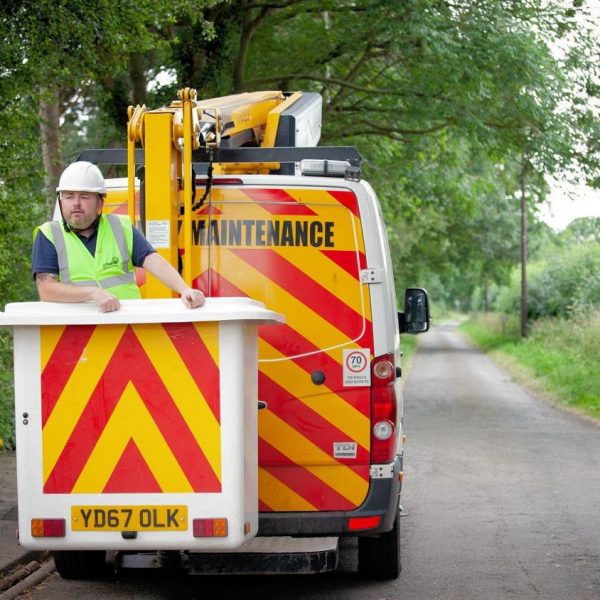Airband Drop Northleigh from FTTP Build so Vouchers Can Deliver

The village of Northleigh in East Devon (England) now stands a good chance of being completely covered by a gigabit-capable Fibre-to-the-Premises (FTTP) broadband network after UK ISP Airband, which held a state aid supported contract to build in the area, de-scoped the community from its wider plans.
At present around 30 premises in the village are already covered by Openreach’s (BT) full fibre network under a contract with the state aid supported Connecting Devon and Somerset (CDS) programme, which was supported by almost £5,000 of funding from CDS in June 2020. But that’s only a small part of the entire village and civil parish, which leaves about 90 premises excluded.
Rival operator Airband also held a similar contract to cover the village, which is mainly because they’ll need to build a core fibre cable through the community in order to reach other locations. But Airband has now decided that it will not cover the rest of the village with its own FTTP network.
Advertisement
The fact that Airband held the contract for Northleigh meant that properties in other, more poorly served, parts of the village couldn’t apply for the Government’s Gigabit Broadband Voucher Scheme, which offers up to £1,500 for households and £3,500 for businesses in the hardest to reach rural areas (with current speeds of less than 100Mbps) to support the cost of installing new gigabit-capable connections.
We’ve seen situations like this before in other parts of the UK and the solution is typically to de-scope the affected premises from the existing contract, although changing a legally binding contract can be tedious and takes time. But the good news is that Airband has agreed to the de-scope.
Redmond Peel, Director of Airband, said:
“We’ve explored all options in assessing this issue, but I feel we’ve reached a decision which will work for everyone. We have always maintained that our priority is to ensure that other communities would not be impacted by this decision to remove Northleigh from our planned rollout as we want to provide ultrafast broadband access to as many hard-to-reach rural communities as possible. Although it’s vital to build through Northleigh to continue delivery of the network across this part of Devon, residents in the community will now be able to deploy their own solution.”
Councillor Marcus Hartnell, Devon County Councillor, said:
“I know this process has been frustrating for the community but it was important that the full implications of descoping Northleigh from the Airband contract were fully considered. This included the impact of delivery of full fibre broadband to neighbouring villages within the contract area, of which I also represent. I welcome this decision by Airband and look forward to offering continued support to residents of Northleigh.”
The press release indicates that this de-scoping was requested by the community itself, which suggests that they already had an alternative project planned to tackle the existing coverage gap. The announcement makes no mention of it, but Openreach were originally lined-up to complete the village’s build – using vouchers – prior to Airband being awarded the CDS contract (CDS didn’t consult the community first).
Sadly, situations like this do occasionally happen, usually when vouchers agreements are reached (or nearly reached) at around the same time as separate state-aid supported contracts get signed (i.e. Openreach perhaps hadn’t got everything approved in time to get their plan included into the usual Open Market Review process). The new Airband contract also appeared to be envisaging a longer wait for FTTP to arrive.
Advertisement
In any case, it appears as if the residents of Northleigh would rather get FTTP from Openreach via vouchers, and perhaps a little sooner, than wait longer for Airband to deliver. Airband didn’t have to de-scope the community, but they chose to do so, which is nice.
Mark is a professional technology writer, IT consultant and computer engineer from Dorset (England), he also founded ISPreview in 1999 and enjoys analysing the latest telecoms and broadband developments. Find me on X (Twitter), Mastodon, Facebook, BlueSky, Threads.net and Linkedin.
« Virgin Media UK Gift LG 4K TV or £200 Credit with Broadband Bundle





















































Well done Northleigh, only 120 premises required for FTTP.
We needed 385 which unfortunately fell very short of the quote!
These schemes are all about the work you do in advance and the more people you engage to help you get to number you need and community does its homework before it asks for a quote, — the old adage of these things the more work to do in advance the less you have to do at the end. its also all about how can I help my community in its entirety help them get better broadband (rather that how do i get a voucher for me) -all small schemes do is create polos where there used to me whole mints (of coverage) government schemes that have to sort polos out resulting in increases cost of premises to BDUK contracts
385 does not seem a horrible number of premises (especially if they are all voucherable )
The polo analogy is a long running scenario back to the subsidised FTTC roll out, I always referred to it like Islands, zoom out a little on the Coverage maps, Islands of decent coverage like an archipelago, separated by nothing(adsl)
I dont know what gets installed specifically where they run fibre out or through a village but it seems like it doesnt actually bring a connection closer to those missed out along the way, just bypasses then entirely, leaving the available connection point still miles away keeping the costs excessively high for small voucher scheme or FttpOD
Gary exactly that which is why the more work you do as a community around how the fibre gets to you and what it passes and who could be included the more wholemints you consume and the less polos you leave for someone else to fix (at a greater cost than the wholemints)
@Fastman – absolutely right, a lot of work upfront pays off. But the problem with polos is that doing a build that’s engineeringly sensible means having to fill in the polo hole anyway. So then it comes down to persuading the folk in the hole to support the ones outside it by going with the new supplier. Most will because they want to support their whole community. Unfortunately it does mean overbuild in the hole with the first builder suffering.